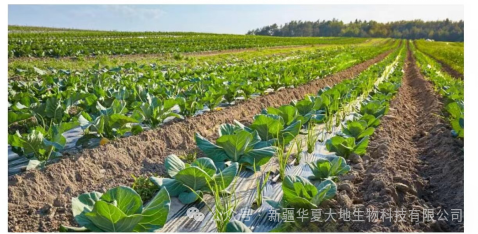 50
50
Invasive weeds are not only annoying in home gardens, but also impose a huge economic burden on agriculture, estimated to cost $33 billion annually. These plants compete with crops for basic resources such as water, nutrients, light, and space.
Plastic film is a commonly used tool in agriculture, which helps to suppress weeds, maintain soil moisture, and regulate soil temperature to increase crop yield. However, traditional plastic mulching films have environmental issues as they do not decompose and cause plastic pollution.
Jonas Baltrasaitis, Associate Professor of Chemistry and Biomolecular Engineering at Lehigh University, is addressing this issue by developing sustainable nutrient delivery materials. His research focuses on creating biodegradable polymers containing complex nutrients for plastic film, aiming to replace traditional plastics with environmentally friendly alternatives.

Baltrasaitis' work has received strong support from the United States Department of Agriculture (USDA) and its National Institute of Food and Agriculture Research. The US Department of Agriculture recently provided him with a research grant of $744000 for a project called "Partnership: Designing Nutrient Enhanced Plastic Films to Improve Degradation and Soil Health". This multi-year program will run from July 2024 to June 2028, bringing together experts from the University of Massachusetts Lowell, the Agricultural Research Service of the United States Department of Agriculture in Maricopa, Arizona, and Ben Gurion University in Israel.
The research team is working hard to combine biodegradable polymers with beneficial nutrients for crops, while naturally decomposing them in the soil. By using a multidisciplinary approach, Baltrasaitis and his colleagues are designing nitrogen efficient materials such as urea eutectic to enhance the functionality of thin films.
Margaret Sobkowicz Kline, a professor in the Department of Plastic Engineering at the University of Massachusetts Lowell, played a key role in the project by applying her expertise to biopolymers derived from renewable resources such as polylactic acid (PLA) and polyhydroxyalkanoates (PHA). Her team combined these bioplastics with urea eutectic to create a film for testing in laboratory and real agricultural environments.
Our collaboration with urea co crystals provides a convenient carrier for delivering nutrients into biodegradable polymers, aiming to develop sustainable solutions for agricultural practices, "Baltrasaitis said. Traditional plastic mulching films have adverse effects on the environment. By developing biodegradable alternatives, we can help reduce plastic pollution, improve soil health, and promote sustainable agricultural practices.
One of the challenges faced by the team is to ensure that the plastic film maintains its effectiveness throughout the entire growing season while effectively biodegrading afterwards. The team is exploring different formulations and processing techniques to strike a balance between durability and biodegradability, and has conducted extensive testing in various soil and climate conditions.
We constantly improve our formula to strike the right balance between durability and biodegradability, "Baltrasaitis said. It is crucial that the film remains effective throughout the entire crop cycle and then degrades without leaving harmful residues. This requires a deep understanding of materials science and agricultural needs.
Cost is another important factor in developing biodegradable film. Traditional plastic films are inexpensive, so making biodegradable options cost-effective is key to their widespread adoption. Baltrasaitis' team is optimizing production processes and creating competitive alternatives for farmers using sustainable raw materials.
The sustainability of agriculture is not just about protecting the environment; it is also about ensuring the economic viability of farmers, "Baltrasaitis pointed out." Our goal is to develop affordable and practical solutions so that farmers can adopt them without affecting their livelihoods
Looking ahead, Baltrasaitis remains optimistic about the potential impact of his research. We have made significant progress in developing nutrient rich biodegradable plastic films that can change agricultural practices, "he said. The ultimate success of our work lies in farmers adopting it and contributing to a more sustainable agricultural system. I am excited about the future and the positive changes we can bring to create a more sustainable and resilient future.


